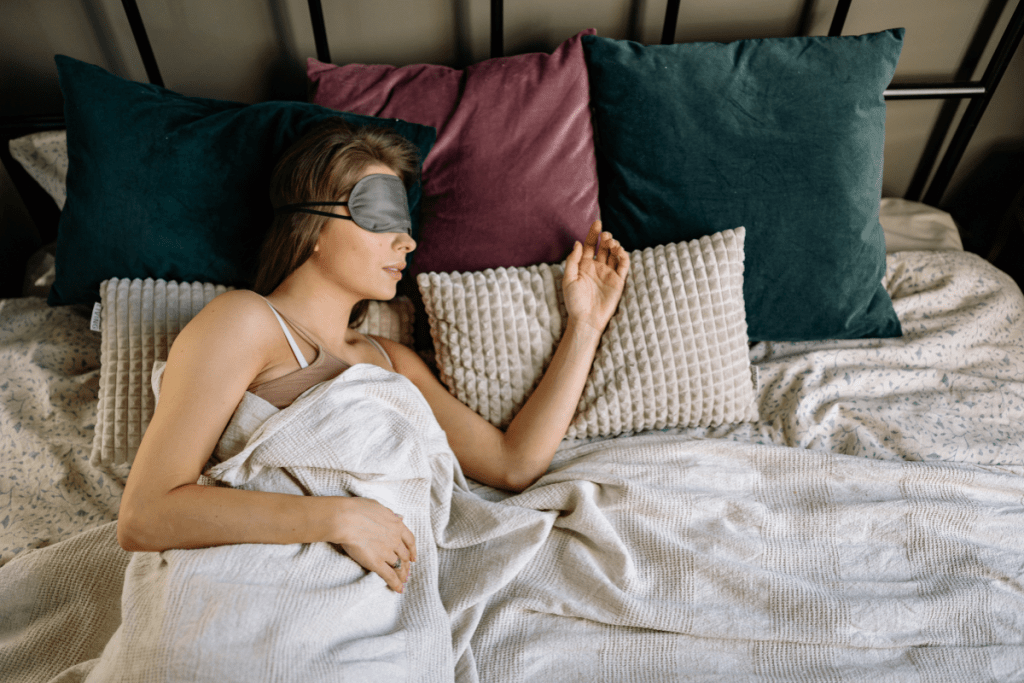You wake up, but your body won’t move. You try to speak, but no sound comes out. For a few moments, it feels like you’re trapped between sleep and wakefulness. This is sleep paralysis—a phenomenon that, while not uncommon, can feel deeply unsettling.
A single episode may be harmless. But when sleep paralysis becomes frequent, lasts longer, or starts to affect your mental well-being, it may point to something deeper, such as REM sleep disruption, chronic sleep deprivation, or a condition like narcolepsy.
Knowing the signs, understanding the triggers, and recognizing when to seek expert guidance can be the first step toward better sleep and better health.
What Sleep Paralysis Feels Like
Sleep paralysis occurs during transitions in and out of REM sleep, the stage of rest where dreaming is most vivid and the body naturally enters a temporary state of muscle atonia, or paralysis, to prevent us from physically acting out our dreams.
During sleep paralysis, the brain becomes awake while the body remains immobile. This can last from a few seconds to a couple of minutes and may be accompanied by intense physical or emotional sensations.
Common symptoms include:
- Inability to move or speak, despite being conscious
- A sense of pressure on the chest or difficulty breathing
- Vivid hallucinations—often visual or auditory
- A feeling of fear, panic, or a presence in the room
- Episodes typically occur while falling asleep or waking up
Although frightening, these experiences are usually not harmful. However, when they happen frequently or interfere with sleep quality, they may indicate a REM-related sleep disorder or another underlying issue that requires attention.
What Causes Sleep Paralysis?
While the experience of sleep paralysis can feel mysterious or even frightening, the underlying causes are often well understood by sleep specialists. The condition typically occurs when there is a disruption in the body’s transition into or out of REM (rapid eye movement) sleep, the stage associated with vivid dreaming and muscle atonia.
Several factors may increase the likelihood of experiencing sleep paralysis:
- Irregular sleep schedules or shift work
- Chronic sleep deprivation
- High levels of stress or anxiety
- Sleeping on your back
- Coexisting sleep disorders, such as narcolepsy or insomnia
When Is Sleep Paralysis a Sign of a Bigger Problem?
Occasional sleep paralysis may not require medical intervention—especially if episodes are brief, infrequent, and not causing distress. However, in some cases, these episodes are more than a passing inconvenience. They may signal a disruption in sleep architecture or an underlying sleep disorder that needs evaluation.
Consider speaking with a physician if you experience:
- Frequent episodes—more than once a month
- Severe anxiety or fear around sleep
- Ongoing daytime fatigue or trouble staying awake
- Hallucinations that continue outside of sleep paralysis episodes
Other signs of sleep disorders, like snoring, gasping for air, or restless legs
Persistent or severe sleep paralysis can sometimes accompany neurological conditions such as narcolepsy, and is worth discussing with a sleep specialist
What to Do When You Experience Sleep Paralysis (and How to Avoid It)
If you find yourself in the middle of a sleep paralysis episode, the most important thing is to stay calm. Though the experience can be frightening, it’s temporary and not physically harmful.
Here’s what may help in the moment:
- Focus on small movements, like wiggling your fingers or toes
- Regulate your breathing to ease anxiety
Remind yourself that it will pass in a few seconds
To help reduce the chances of future episodes:
- Stick to a consistent sleep schedule—going to bed and waking up at the same time each day
- Avoid screens and heavy meals at least an hour before bed
- Create a calming bedtime routine with dim lights and minimal stimulation
- Limit caffeine and alcohol, especially in the evening
- Sleep on your side, as back-sleeping is linked to more frequent episodes
Managing stress and maintaining healthy sleep habits are key in preventing recurrent episodes. If symptoms persist, working with a sleep specialist can provide clarity and lasting relief.

When to Talk to a Sleep Specialist About Sleep Paralysis
While sleep paralysis might seem like something to live with, recurring or distressing episodes can be a sign that your body isn’t getting the restorative sleep it needs. Episodes that leave you anxious, exhausted, or fearing bedtime could point to REM sleep disruption, narcolepsy, or another underlying sleep disorder.
That’s where a sleep medicine specialist can make a meaningful difference. At Clayton Sleep Institute, we don’t just monitor symptoms—we uncover root causes. Our board-certified team uses advanced diagnostics to evaluate your sleep patterns and design a care plan tailored to your needs.
Whether through our luxury in-clinic sleep studies or convenient at-home testing, we aim to deliver answers and relief in a setting that prioritizes your comfort and well-being. Because better sleep isn’t just about rest—it’s about reclaiming your energy, focus, and quality of life.
If sleep paralysis is becoming more than just an occasional experience, talk to your doctor about a referral to Clayton Sleep Institute. Expert insight could be the first step toward more peaceful nights—and better days.
Resources:
- Cleveland Clinic
Cleveland Clinic. (2023). Sleep paralysis. Cleveland Clinic. https://my.clevelandclinic.org/health/diseases/24101-sleep-paralysis - Mayo Clinic
Mayo Clinic Staff. (2023). Narcolepsy: Symptoms and causes. Mayo Clinic. https://www.mayoclinic.org/diseases-conditions/narcolepsy/symptoms-causes/syc-20375497 - Sleep Foundation – Treatment
Sleep Foundation. (2023). How to stop sleep paralysis. Sleep Foundation. https://www.sleepfoundation.org/sleep-disorders/sleep-paralysis/treatment - National Institute of Neurological Disorders and Stroke (NINDS)
National Institute of Neurological Disorders and Stroke. (2023). Sleep paralysis. U.S. Department of Health and Human Services, NIH. https://www.ninds.nih.gov/health-information/disorders/sleep-paralysis - Thomas, L. (2023). Sleep paralysis: Treatment and prevention. News-Medical. https://www.news-medical.net/health/Sleep-Paralysis-Treatment-and-Prevention.aspx

